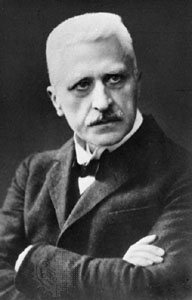Rudolf Otto | |
|---|---|
 | |
| Born | 25 September 1869 |
| Died | 6 March 1937 (aged 67) Marburg, Germany |
| Academic background | |
| Alma mater | |
| Influences | Friedrich Schleiermacher, Immanuel Kant, Jakob Fries |
| Academic work | |
| Discipline | Theology and comparative religion |
| School or tradition | History of religions school |
| Notable works | The Idea of the Holy |
| Notable ideas | The numinous |
| Influenced | Eliade, Jung, Campbell, C. S. Lewis, Tillich, Barth, Rahner, Heidegger, Wach, Horkheimer, Gadamer, Strauss |
| Part of a series on |
| Lutheranism |
|---|
 |
Rudolf Otto (25 September 1869 – 7 March 1937) was a German Lutheran theologian, philosopher, and comparative religionist. He is regarded as one of the most influential scholars of religion in the early twentieth century and is best known for his concept of the numinous, a profound emotional experience he argued was at the heart of the world's religions.[1] While his work started in the domain of liberal Christian theology, its main thrust was always apologetical, seeking to defend religion against naturalist critiques.[2] Otto eventually came to conceive of his work as part of a science of religion, which was divided into the philosophy of religion, the history of religion, and the psychology of religion.[2]
- ^ Adler, Joseph. "Rudolf Otto's Concept of the Numinous". Gambier, OH: Kenyon College. Retrieved 19 October 2016.
- ^ a b Alles, Gregory D. (2005). "Otto, Rudolf". Encyclopedia of Religion. Farmington hills, MI: Thomson Gale. Retrieved 6 March 2017.